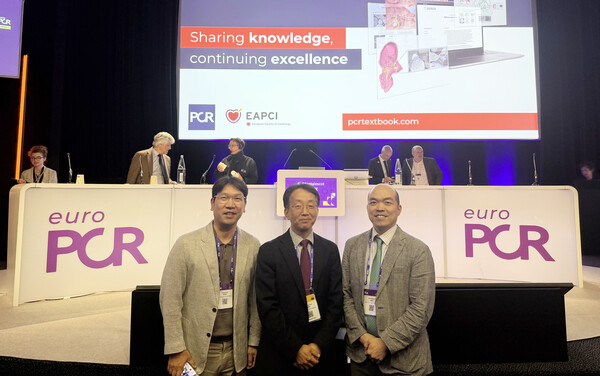Switching patients undergoing stenting for acute coronary syndrome (ACS) to prasugrel monotherapy after one month of dual antiplatelet therapy (DAPT) significantly reduces the risk of bleeding while maintaining safety, according to a recent study.
The European Association of Percutaneous Cardiovascular Interventions (EAPCI) named the study one of the top three research presentations of the year.
Gachon University Gil Medical Center announced Tuesday that the study titled “One-month dual antiplatelet therapy followed by prasugrel monotherapy at a reduced dose: the 4D-ACS randomized trial” -- led by Professors Jang Young-woo and Kang Woong-chol of the Department of Cardiology -- was selected as one of the Top 3 Late Breaking Trials at the 2025 European Course on Percutaneous Cardiovascular Revascularization (EuroPCR), Europe’s largest cardiac intervention conference.

The research team presented their findings last Wednesday (local time) in Paris, France, under the session title “4D-ACS: The effect of short Duration of DAPT followed by Dose reduction after Implantation of DCS in ACS patients.” The study was a joint effort with Professor Park Sang-don of Inha University Hospital and Professor Suh Jon of Soon Chun Hyang University Hospital Cheonan.
A paper detailing the study results was published the same day in the international journal EuroIntervention.
The researchers randomized ACS patients who had undergone stenting into two groups: one continued on 12 months of dual antiplatelet therapy, and the other switched to prasugrel monotherapy after one month. The one-month group experienced a 13-fold reduction in bleeding-related events and a nine-fold reduction in gastrointestinal bleeding, with no significant difference in ischemic events between the two groups.
“I’m deeply honored to receive this recognition,” said Professor Jang. “We received many questions and much attention from world-renowned scholars, which motivates us to continue advancing research and clinical practice in this field.”
Professor Kang added, “There has been significant curiosity and a lack of prior research on this topic, so the medical community showed strong interest. We will continue striving for globally recognized clinical and research excellence.”

